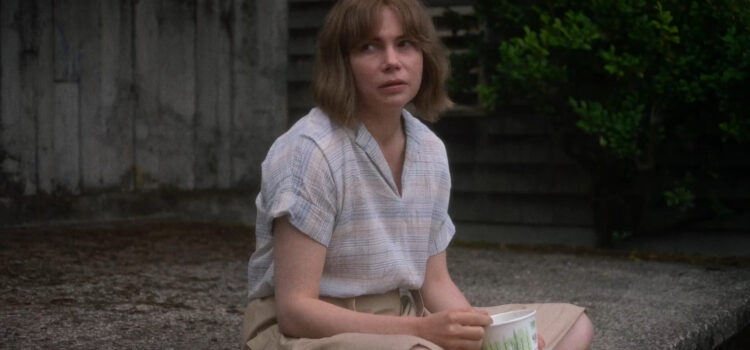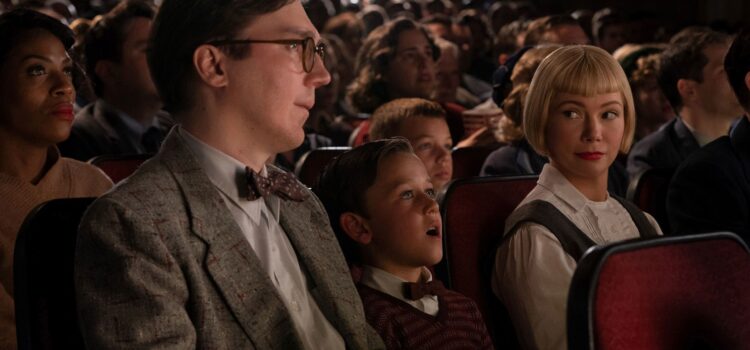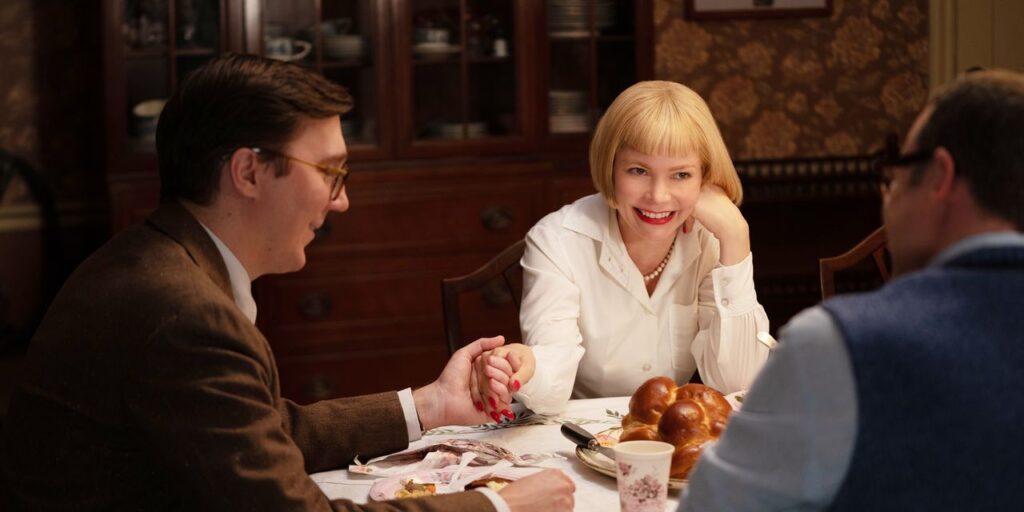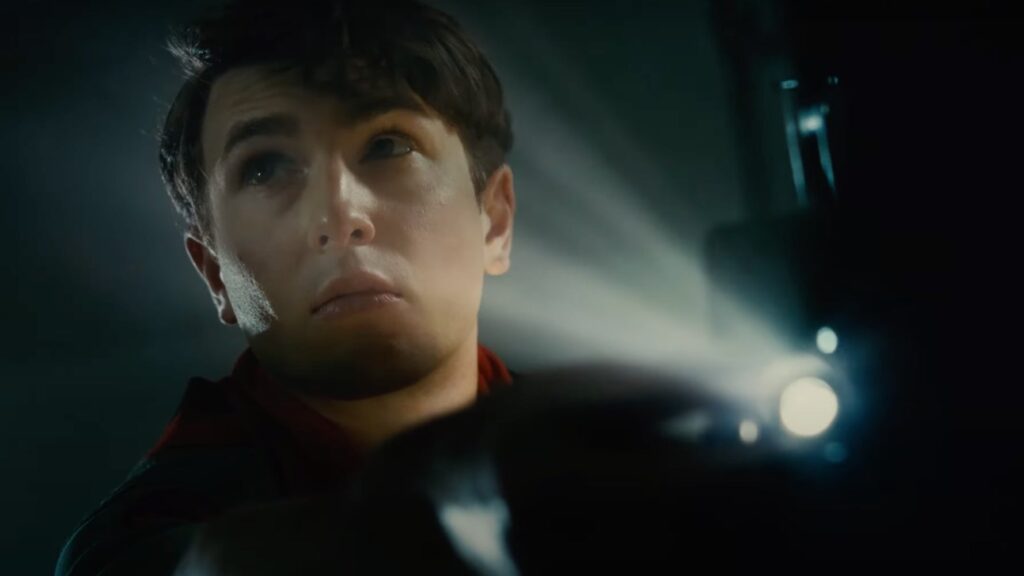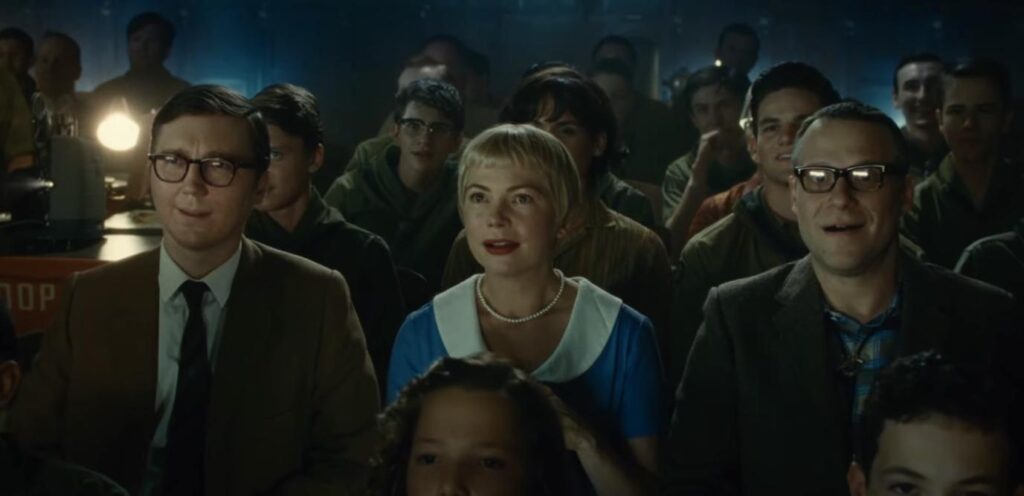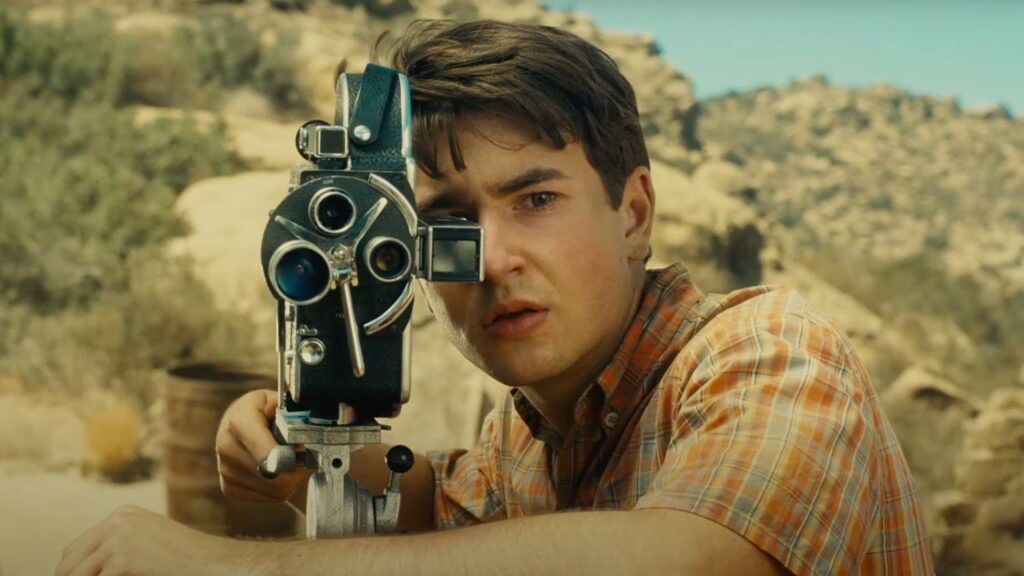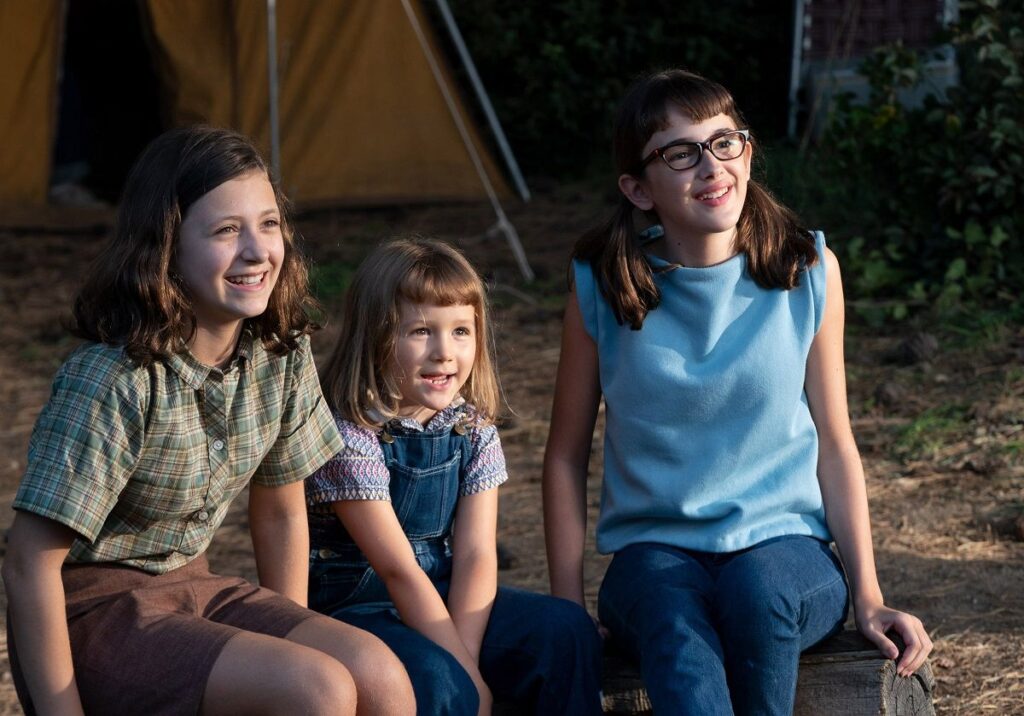By Alex McPherson
A gentle, tender exploration of art, creativity, and life’s winding, surprising journey, director Kelly Reichardt’s “Showing Up” reveals poignant truths through its small-scale yet meaningful narrative.
Reichardt’s film centers on the anxious, non-assertive, and perpetually fatigued Lizzy (Michelle Williams), an artist struggling to make a name for herself in Portland and preparing for an upcoming show. She would much rather immerse herself in her (somewhat tortured-looking) clay sculptures than deal with the messy distractions of other human beings, much less endure the dull grind of making enough money to pay rent.
She works as an administrative assistant at the Oregon College of Art and Craft — facilitating promotion of other, more successful artists — where her mother, Jean (Maryann Plunkett), is the artistic director. This furthers Lizzy’s low self-esteem and makes asking for a vacation day quite uncomfortable. With her slumped shoulders and exhausted, stand-offish demeanor, Lizzy stands apart from students who exuberantly indulge in their creative callings on campus, especially those doing interpretive dance in full, glorious view.
Her neighbor/friend/landlord, Jo (Hong Chau) — a comparatively outgoing, popular, successful artist herself, with two upcoming art shows— hasn’t resolved Lizzy’s non-working hot water heater, adding yet another layer of annoyance for the quietly resentful Lizzy to contend with. Plus, a few nights before her big show, Lizzy is woken up in the middle of the night by a pigeon who’s wandered into her apartment and been attacked by her cat. After Lizzy leaves the pigeon outside post cat-attack, Jo, of course, bandages it up, and entrusts it in Lizzy’s care.
Along with that, there’s her father, Bill (Judd Hirsch), a retired artist himself who lets two ne’er do well drifters crash at his place, and her brother Sean (a scene-stealing John Magaro), who Jean describes as the artistic “genius” of the family, and whose turbulent mental health weighs heavily on Lizzy’s mind.
It’s all a lot for Lizzy to juggle as she prepares to present her work, but Reichardt doesn’t indulge in heightened melodrama. “Showing Up,” with its breezy yet thoughtful rhythms, reflects the power of art as self-expression, as an all-consuming force, and as a means of bringing people together; of how small acts of compassion yield surprising returns, and how life itself, like Lizzy’s malleable sculptures, remains beautiful through its imperfections. Moments of connection show up in the most unexpected places.
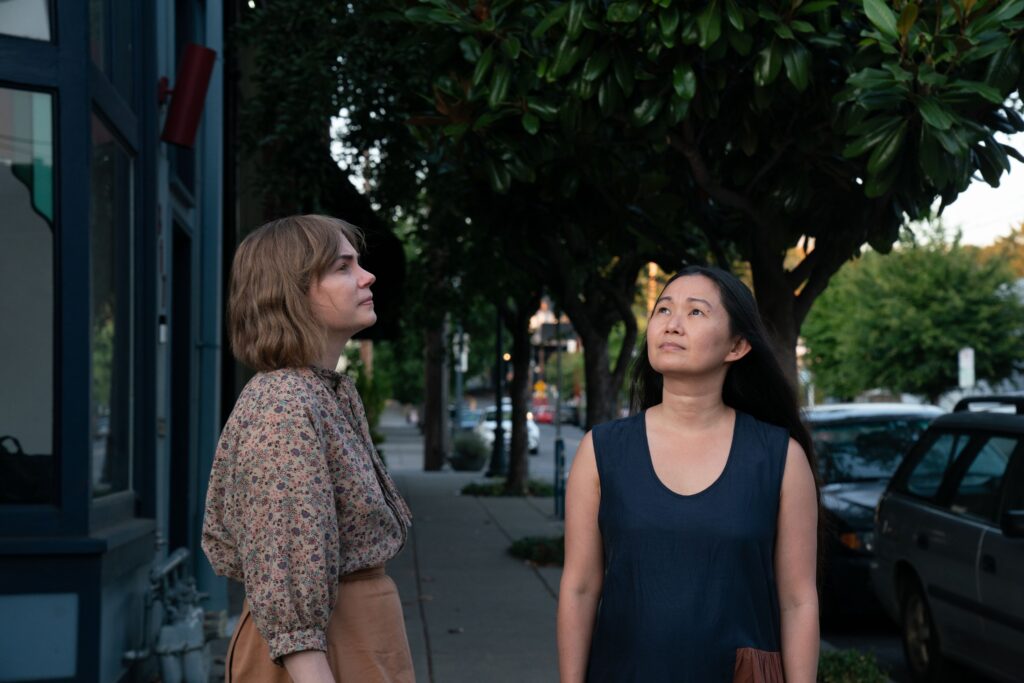
With all these themes, “Showing Up” would seem at first glance to be a very busy movie. Under Reichardt’s patient direction, though, the film effectively brings us into Lizzy’s world and illuminates the complex connections that both create distance and bring us together. Similar to her previous masterpiece, “First Cow,” Reichardt gives scenes plenty of time to breathe, letting us sit with Lizzy’s discontent, appreciate art of all forms, and watch a story unfold that doesn’t force-feed viewers answers or wrap everything up neatly in a bow.
Reichardt and screenwriter Jonathan Raymond thrive within the nuances of characters’ interactions — the minimalism reveals multitudes about the characters, trusting viewers to put the pieces together themselves and recognize evolution in characters’ arcs that doesn’t feel over-the-top and sensationalized, but beautifully human.
Complemented by an excellent ensemble that’s perfectly in-tune with the film’s low-key vibes and an efficient style that encourages looking beneath the surface (enhanced by Ethan Rose’s serene, flute-based score), the film has a power that percolates upon further reflection — so long as viewers are willing to adapt to its measured pacing and lack of traditionally “dramatic” moments.
Indeed, “Showing Up” takes ample time observing Lizzy slowly but surely unlocking her compassion towards others and the world in general, while providing a grounded look at artists-at-work. One sequence, for example, sees Lizzy rearranging the arms on one of her sculptures, which were originally made by artist Cynthia Lahti; cinematographer Christopher Blauvelt’s camera sits over her shoulder for an extended long-take, with only the intermittent “coo-coo” from the pigeon to accompany her. It’s both a quiet, drawn-out scene, and one where so much happens internally, if we’re game to put ourselves in Lizzy’s shoes.
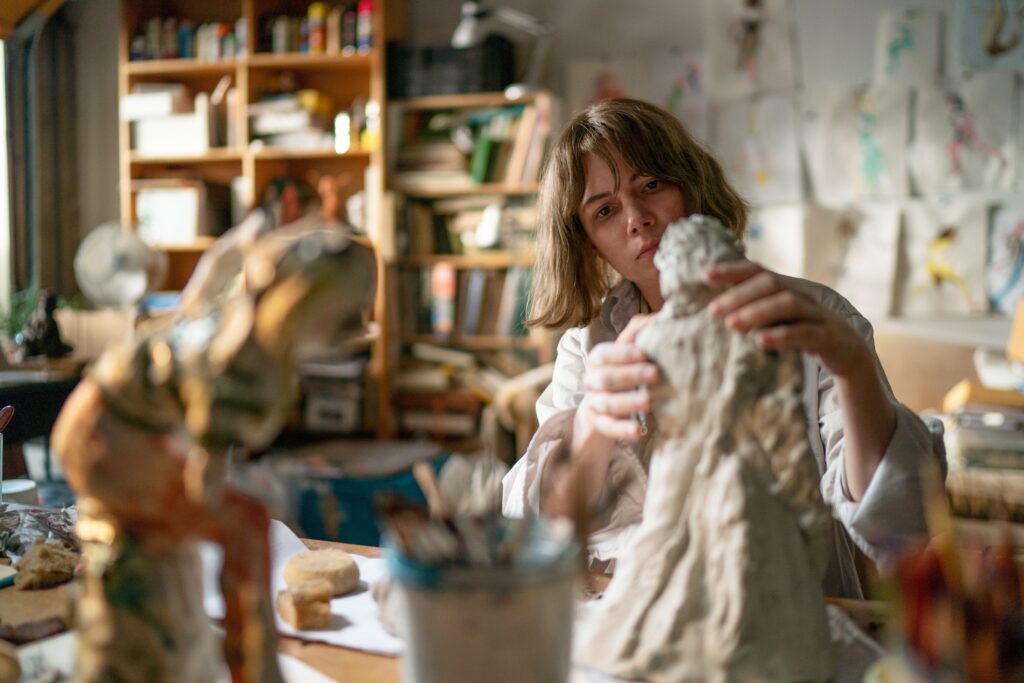
Creating art is Lizzy’s preferred way of communicating with the world, and “Showing Up” illustrates how her lifestyle is both rewarding and barely sustainable. Her passion and persistence are often at odds with the rigid expectations of adulthood and personal challenges by those who, at least initially, let her down at critical moments. The aforementioned pigeon, which Lizzy first cares for out of a sense of guilt, is partly responsible for the erosion of her cynicism and reservedness; she finds some solace and relatability to this often-ignored animal in need.
Although the pigeon’s symbolism could be heavy-handed under a less-skilled storyteller, Reichardt’s approach remains neither overplayed nor maudlin. Lizzy’s bond with the bird, as well as her troubled, paranoid brother Sean; her stubborn yet caring parents; and Jo, a close friend whom she also harbors jealousy towards, point to an overarching message: the small acts of kindness and thoughtfulness Lizzy takes towards them (showing up, in other words), and vice-versa, ultimately make all the difference, inspiring hope for a new day of possibilities.
Williams is outstanding here — bringing to life Lizzy’s malaise and emotional growth in a manner that never feels overstated, rather embracing intricacies and minutiae of body language, not unlike the sculptures Lizzy so meticulously puts together. Chau is similarly exceptional as Jo, radiating enthusiasm for her craft and frustration through her flakiness and laissez-faire mindset regarding her responsibilities as a landlord.
Hirsch is charming as Lizzy’s father (with old man jokes to spare), and Magaro stands out as Sean, bringing true pathos and melancholy to his amusingly deadpan comments. André Benjamin is excellent as a laid-back kiln operator, possessing a warmth and nonjudgmental attitude contrasting Lizzy’s high-strung demeanor and the obsessive attention she puts toward her sculptures.
“Showing Up,” alas, will likely alienate viewers refusing to dig into the small-scale yet potent canvas that Reichardt lays before us. The film’s style occasionally lets scenes drag on just a beat too long, and the film requires some leg-work to untangle the threads of its deceptively straightforward narrative. For me, however, “Showing Up” is one of 2023’s strongest efforts yet — a life-affirming film that’ll only grow stronger with time.
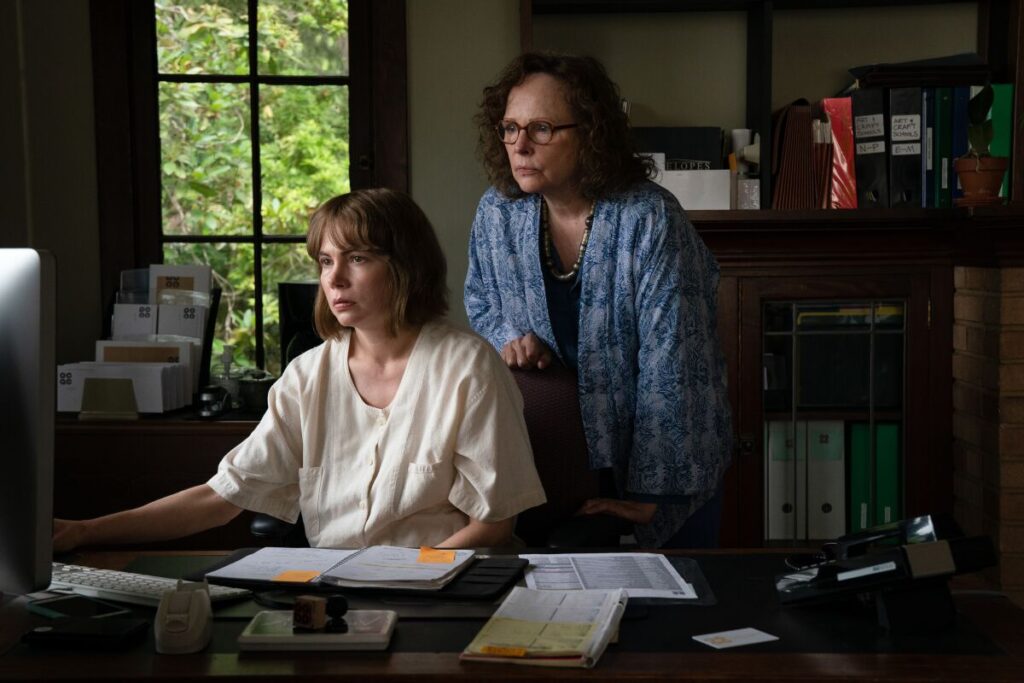
“Showing Up” is a 2023 comedy-drama directed by Kelly Reichardt and starring Michelle Williams, Hong Chau, Judd Hirsch, John Magaro, Andre Benjamin and Maryann Plunkett. It is rated R for brief graphic nudity and runtime is 1 hour, 47 minutes. It opened in select theatres April 28. Alex’s Grade: A.
Alex McPherson is an unabashed pop culture nerd and a member of the St. Louis Film Critics Association.

